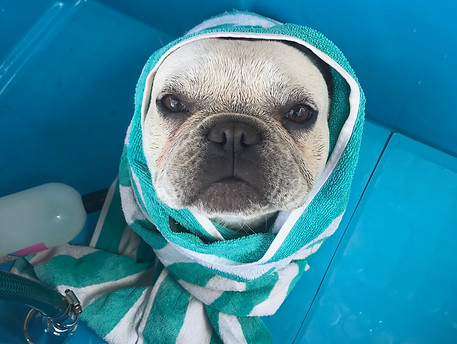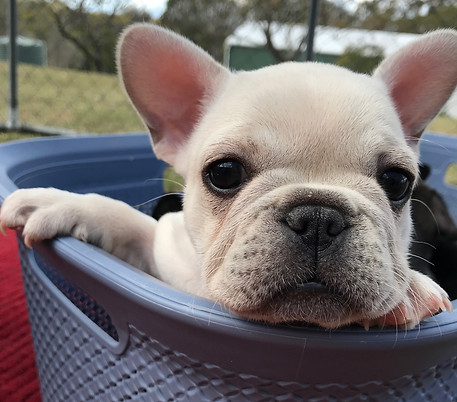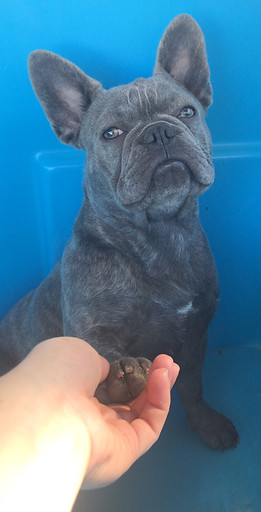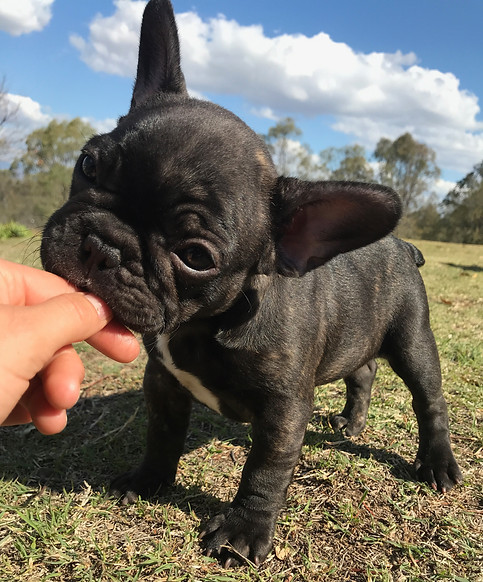No dogs pregnant at the moment
All puppies come with:
All puppies come with:
All puppies come with:
All puppies come with:
All puppies come with:

Quality Frenchies
Health
Worming
Puppy are wormed regularly at 2, 3, 4, 5, 6 and 7 weeks of age with Milbemax and is due for its 8 week worming now. Worm with DRONTAL 1x10 kg size, then at 10 and 12 weeks of age, then at 4, 6, 8, 10 and 12 months. Worm 3 times a year after 12 months. We use and recommend Frontal.
Heartworm : Use « Heartguard » for prevention of heart worm. These are based on weight of puppy/dog and are given each month for life.
Flea/Tick control
Products are Frontline or Advantage for fleas or « Frontline Plus » or « Advantix » if you live or visit paralysis tick areas. These products are a « spot on » the back of the neck treatment each month. Bravecto does fleas for 3 months and ticks for 4 months, this is what we use on dogs over 10 weeks of age.
Vaccination
Puppy has had his initial 6 week vaccination and needs another one at 12 weeks then at 16 weeks, then at 15 months of age. Some Vets recommend yearly vaccinations. There is a lot of conflicting information on whether dogs actually need a yearly vaccination but if you are intending on using a boarding kennel, then they always require one. We vaccinate our adult dogs every year.
Bathing
Bath every week until 12 weeks to get the puppy used to the bath then on a regular basis to keep smelling sweet and clean. Brushing with a bristle brush or a rubber pad is also a good idea. Always finish the routine with a little reward. It is also important to clean out the loose face folds on your dogs face. Using a non scented nappy wipe every few days to avoid the build of moisture which can lead to infection.
Hygiene
Clean weekly with « wet wipes » or something similar to get the puppy used to having the ears cleaned. Ears should be checked weekly and cleaned as required. If neglected, ears can become sore and affect the format of your dog's ears. Toenails should be trimmed regularly.
Heatstroke
Heatstroke can be fatal very quickly. So if the weather is hot, take great care of your Bulldog. Exercice either early in the morning or late at night. Never allow children to run and play with your dog in the heat of the day. And never, ever leave your dog alone in a car, NOT EVEN for a couple of minutes. Once a Bulldog has suffered from heatstroke, they seem much more susceptible to heat.
Temperatures
Bulldogs are very sensitives to extreme temperatures, both hot and cold. A nice mild climate is best for a happy and comfortable Bully.
IMPORTANT TIPS
Watch your puppy carefully as they sometimes eat rocks, dirt, sticks and whatever else they can find. This can often does result in serious intestinal problems. Keep a close watch on them, giving them alternatives such as Kong toys as they are very durable and provide hours of entertainment. Carpet bedding can also be a problem if they swallow it. DO NOT KEEP YOUR PUPPY ON SLIPPERY SURFACES. If your puppy’s back legs are slipping, this can course leg and hip problems. Tiles and slippery timber surfaces are NOT suitable for a young dog.
Other health problems can include : hip dysplasia, allergies, cherry eyes, cataracts, synoptic nares, inverted tail, shoulder luxation.
Desexing should only be done after their fist heat or at 12 months of age. As before they can course incontinence

Welcoming your Bulldog puppy

Caring for you new Bulldog puppy
Owning a dog can be an extremely rewarding experience, but it also carries with it some responsibilities. We hope these notes we have put together will give you some help. Quality Frenchies puppies are the results of carefully nurturing mother and her puppies, raising them on a healthy diet and socialising them in a happy environment until the day arrives when they go to their new homes. We hope you will continue this work for a happy and healthy puppy.
Taking your new dog home
-
Take your new puppy into your garden or were you intend and encourage him:her to sniff the ground.
-
He/She should be ready to go to the toilet and when your pup does, make a big deal, congratulating your puppy so he/she understands that this is where he/she does there business. Your pup has now learnt where the toilet is.
-
Watch out for signs of him/her wanting to go in the future, actions like pacing or standing at the door.
-
Don’t let children harass your puppy if they want time out to rest and take it all in, LET THEM.
The first night
-
Decide on which room your dog will be sleeping in. Usually a pace as quiet as possible and make sure he/she has a soft confortable bed.
-
Your puppy has been use to sleeping among other puppies so make lumps under the blanket and scatter some stuffed toys around his/her bed to make him feel more secure and less lonely. A soft radio in the background may also help. Puppy pads should also placed by the puppy bed area to help with overnight accidents until your puppy becomes house trained.
-
Settle your pup down just before you go to bed yourself. Any activity outside the room once the pup is settled may cause him/her to try and get your attention.
-
Don’t make a major fuss perhaps a treat, tuck him/her in bed and leave the room.
-
If at all possible, let your puppy sleep on his/her bed next to your bed until settles in. Remembering your puppy is still just a baby and will be looking to you to make them feel secure. They like to feel part of the family as well so please don’t be afraid to spoil them. They will give you so much more in return as they get older.
-
Your new pup may cry at night. Please be patient. He/She is frightened especially when they can’t see you. Please put yourself in their shoes. They leave their siblings, their environment and their routine they have been use to since the day they were born and you have taken them to their new home, new people and new surroundings all in one day.
-
Then they are expected to sleep on their own. Please be patient and remember that your puppy is only 8 weeks old.
Feeding & Exercise
While every one loves a rolly fatty Bully, it is not healthy to over feed them and doing so can load of problems from placing extra forces and wear and tear on joints, causing hip dysplasia. Their flat face and soft palate cause many Bulldogs to have breathing difficulties. So it is important to keep them fit, but not over do it. In the first year, avoid high impact exercice such as leaping and jumping so NO frisbee, balls being thrown high, leaping in and out of cars. It is no good doing nothing Monday to Friday and then come the weekend take them for a huge walk, be consistant. Bulldogs are NOT good swimmers. Be careful with your Bully around water
DO NOT LET YOUR PUPPY
-
WALK / SLIDE ON SLIPPERY SURFACES
-
JUMP
-
CLIMB STAIRS
-
OVER HEAT
-
OVER EXERCICE
-
NO LONG WALKS, if your puppy is tired they will stop or lay down, let them, or pick them up and carry them the rest if the way.
-
BE EXTRA CAREFUL WITH WATER, Bullly sink.
Do's and Do not
DO
-
Take your dog for short walks every day, keeping them on your left
-
Sometimes, put your hand in your dog’s food bowl while eating. Give a quick stir with your finger and don’t allow any negative response
-
Sometimes, when your dog has a bone or a toy in their mouth, gently take it our and give the command « GIVE » as your are removing it. Use the same word every time. Remember, dogs cannot speak English but can, learn the meaning of many words
-
Touch your dog’s paws. This will help them get used to having their nails clipped
-
Every time your dog does something right, PRAISE THEM
-
Wash your dog’s bowl after every meal
-
Change your dog’s water bowl at least every meal
-
Watch your dog’s weight, restrict their food if they are getting too fat. Fat is NOT healthy
-
Beware of your dog’s health. If your dog is constipated or very loose in the bowel for more than 24 hours, seek veterinary advice
-
ENJOY YOUR DOG

DO NOT
-
Call your puppy then hit or punish them. Coming to you must always be fun
-
Expect your dog to remember or reason the way humans do. Dogs must be trained as, lets be honest, Bulldogs are not one of the best obedience training students. Don’t be fooled, they are capable, but speak to them in a language that they can understand
-
Expect too much too soon. Dogs take time to learn. With help and patience, your dog will become a companion you will be proud to own
-
Let bad habits form. Dogs do not grow out of bag habits. If you let your dog « play-bit » your hand, jump on you and pull your clothes, they will continue to do so all his life
-
Leave food out for your dog more than 10 minutes
-
Let flies and germs contaminate your dog’s food
-
Feed your dog human food such as chocolate, sweet biscuits, cake ect
-
Feed your dog from the table. Keep them away from the table while eating
Training
Let’s be honest here, Bulldogs are not one of the best obedience training students. But don’t be fooled, they are capable.
It’s important that you establish yourself as your Bulldog puppy’s leader. Give him/her clear guidance, in a positive non violet manner. Be consistent in your training, use plenty of encouragement and always enthusiastically reward desired behavior.
Below are some training issues you and your Bulldog puppy should practice together :
-
As soon as your puppy arrives home, you need to begin teaching him/her proper household etiquette. This includes things like chew toy training (Bullys love to chew), puppy house training, preventing food stealing and other basic tasks. Preventing problems before they arise is always a better alternative thant trying to rectify established problem behaviors.
-
Crate training is a good way to supervise and confine your puppy, for your benefit and your puppy’s wellbeing. It is also a useful tool to use when housebreaking your Bulldog puppy.
-
All of the basic obedience commands are easily learned by Bullys. They should be taught sit, stay, down, heel, come etc. Your puppy will enjoy these training sessions and you will build a very strong connection with your dog dugong the training process.
-
Training your puppy to walk nicely on a loose leash, harness is preferred, is an important skill to master. Bulldogs grow to be big powerful dogs, so it’s crucial to educate your puppy how to behave on the leash.
-
Bulldogs can be a bit stubborn or some may say indifferent towards training but keep your training sessions short, intense and fun. You’ll be sure to achieve pleasing results.
